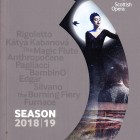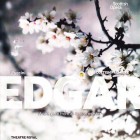Edgar 2018Scottish Opera
Read more about the opera Edgar
Edgar has always received a bad press, and there has never been any sign that it would join the regular operatic repertoire. Puccini's first opera, Le villi, which Scottish Opera performed in concert two years ago, was found to contain some superb sequences, though it was not well structured, and a short piece, as much ballet as opera. On that basis, it was still well worth hearing, and very well performed.
It was, if anything, even more interesting to hear its successor. With a text by the same cack-handed writer, Ferdinando Fontana, but this time making a full-length work. Puccini took three attempts to get Edgar right, with his revisions finally ending after he had completed Manon Lescaut, La bohème, Tosca and Madama Butterfly. Did he then give it up as a bad job, or was he at last satisfied with it? Certainly he never used a text by Fontana again, and tried a succession of different writers on Manon Lescaut before finishing the job himself. Giacosa and Illica became fixtures for the next three works. Given the long period during which he tinkered with Edgar, it is hardly surprising that the orchestration contained hints not just of Manon Lescaut and La bohème, which both included recycled earlier work anyway, but also of the much later La rondine. Perhaps an important influence can also be seen in Puccini's teacher Ponchielli. After all, he would have seen how the older composer succeeded in making the thoroughly ridiculous libretto for La gioconda into a hugely enjoyable piece of hokum that works amazingly well in performance.
Just as Fontana used German folklore as his source for Le villi, there is something distinctly teutonic in Edgar. The idea of a knight involved with two women, one pure, one less so, does seem rather Wagnerian - elements from both Lohengrin and Tannhäuser as well as Weber's earlier Euryanthe. It is easy to see why Puccini accepted the subject, but a relief to see that the main gain for his future career came from the knowledge that he had to have a satisfactory text before he started - Manon Lescaut and his later operas gained immeasurably from this.
Accepting that the opera is not a masterpiece with a future of regular performance ahead of it, what do we make of it? Fortunately, Scottish Opera made as good a case as possible. The seriousness of approach and the sense of conviction by all the performers was wonderful. As with all these Sunday afternoon disinterments, the soloists had taken the trouble to learn their parts by heart - even though unlikely to need them again - and were thus able to provide enough acting (tactfully directed by Roxana Haines) to indicate events.
The contrasting female roles were both given true star performances. Claire Rutter has made several appearances with Scottish Opera in concerts of this kind, and she managed to produce a great deal of intensity in a performance that called for some powerfully expressive singing. Justina Gringytè threw herself at the role of Tigrana with abandon. She was an excellent Carmen a couple of years ago, and Tigrana makes that character seem almost angelic. How strange that Puccini composed so little for mezzo voice - Suzuki could hardly be more different, and there is not much else - just the fearsome aunt in Suor Angelica. Certainly this part has plenty of interest, and the singer clearly enjoyed projecting the evil elements of the character.
Of the men, Edgar has most to do, and vocally it is a beast of a part. It calls on a lot of power while also requiring the tenor to produce reams of exposed high notes - Calaf on steroids. Peter Auty has tried out several parts in these Sunday afternoon events, and may be happy not to return to this particular role, but he made as convincing a case for the character as he could, and managed to include some lovely lyrical singing among the heroics.
David Stout, as Frank, Fidelia's brother, had a very difficult task to make something convincing of the character, as a rival of Edgar in the affections of Tigrana. But he was musically important and made a powerful impression. Richard Wiegold, as the siblings' father, had less to do, but his warm-toned bass provided a firm grounding in the ensembles.
At the centre of everything was the conductor, Gianluca Marcianò. He exerted a disciplined control over his forces, producing a wide range of dynamics from the orchestra. The regular chorus of freelancers, billed as the 'Chorus of Edgar' were also on trenchant form for this one-off event - particularly notable as the men, at least, had been on equally good form the previous evening as the 'Chorus of Rigoletto'.
This was, again, a fascinating afternoon. Of the pieces Scottish Opera has let us hear in this series, the two early Puccini works are probably the operas least deserving of full-scale performances. Perhaps that is the greater justification for mounting them in this form.
Scottish Opera's 2018/19 season started off with the company's first full-scale staging of one of the most popular works of the verismo school in Leoncavallo's Pagliacci. This was seen in Paisley in July - an impressively large-scale production with many local performers, all in a temporarily-erected marquee. The new stagings include a world premiere, Anthropocene, an eagerly awaited further collaboration between Stuart MacRae and Louise Welsh. There is also a new Kátya Kabanová. Returning to the composition period of Pagliacci, the continuing Sunday afternoon concert series includes Scottish premieres for Puccini's second opera, Edgar, and Mascagni's fifth, Silvano. There are also major revivals, and long tours, for Matthew Richardson's staging of Rigoletto from 2011 and Sir Thomas Allen's of The Magic Flute (2012).




